The Day that Mulinazzo Cried
Maria Anna Manzella
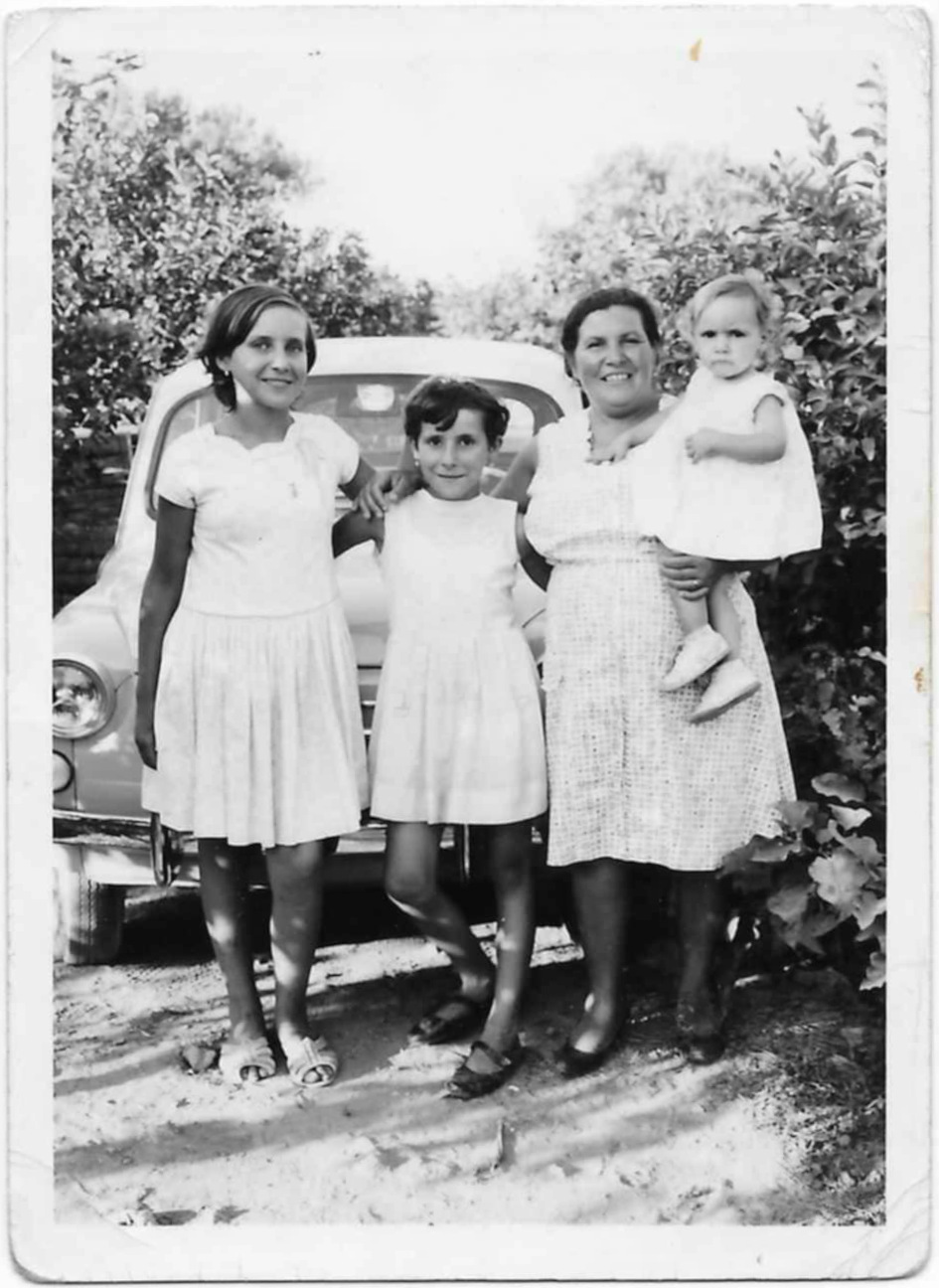
Manzella with her family, at age 13
| Sicilianu | English |
Lu Jornu ca lu Mulinazzu Chiancìu is available at Amazon:
An English language edition will be published next year, in 2026.
Manzella has also published a second book of poetry, Mumenti in Puisìa (Moments in Poetry), which is available at Amazon:
The selection of poems below describes the expropriation of the Mulinazzo land in 1968 for the purpose of expanding Palermo's airport.
In her 2022 book, Lu Jornu ca lu Mulinazzu Chiancìu (The Day that Mulinazzo Cried), Maria Anna Manzella describes her childhood while growing up on the Mulinazzo land, the land's natural beauty, the protests against the seizure of the land, and the hardships and injustices that the community experienced after they lost their homes and way of living. Her book of poetry also describes the strong family and community bonds and the fight for justice. And it concludes with her family's reluctant migration to the United States, where they found a new land and a new life.
Our Royal Palace
We grew up smeared with the Mulinazzo soil,
My dad like a king, my mother like a queen,
And a beautiful family of seven royal kids,
In a squalid palace with clay roof tiles,
One room only with a tiny window,
And a shelf in the corner for the oil lamp,
With no water, electricity, or other conveniences.
There was only space for two beds,
One for my parents and the other for us children,
With straw mattresses laid over wooden boards
That were carried from the town
With my grandpa's mule and carriage.
I remember I was only four years old,
When my father purchased this land,
And with pursuit, he planted his lemon orchard.
Shortly, it looked like a Garden of Eve,
With a variety of fruit trees:
Grapes, figs, plums, pears, apricots,
Pomegranates, small apples, small pears,
Peaches, quinces, and prickly pears.
Nothing was missing from this land
And every summer, at the end of the school,
We moved to this cottage and went to work.
My father improvised a rural stove,
Placing two stones on the ground for the fire
And daily we cooked outside with the quadara.*
Every day, we sat cheerful at table,
Under the grapevine pergola,
Sitting over wobbly, broken chairs,
Carefree, with the smell of smoke in the air.
We washed the dishes outside in a basin,
Using the cooking water from the pasta.
Every morning, we walked to our neighbors
To fetch the water from the well,
Carrying an amphora or a galvanized jug.
We made this hut welcoming
And planted different flowers:
-Zinnia, carnations, summer cypresses, and jasmine.
For many years, we shared a happy life in this small cottage,
Listening to the singing of cicadas, that sang a lullaby,
My father resting on the aricchiena,*
My mother like a queen in the royal palace,
Enjoying the breeze and the tranquil life,
And when the air was still, cooling off with a hand fan.
We grew strong and healthy in this land,
And at a young age, we acquired experiences unknown to others.
Despite its simplicity, this cottage taught us:
In life, it's not riches and grandeurs
That make people happy,
But being always united with the family:
This is wealth!
* Quadara: tin copper cauldron.
* Aricchiena: antique stone bench.
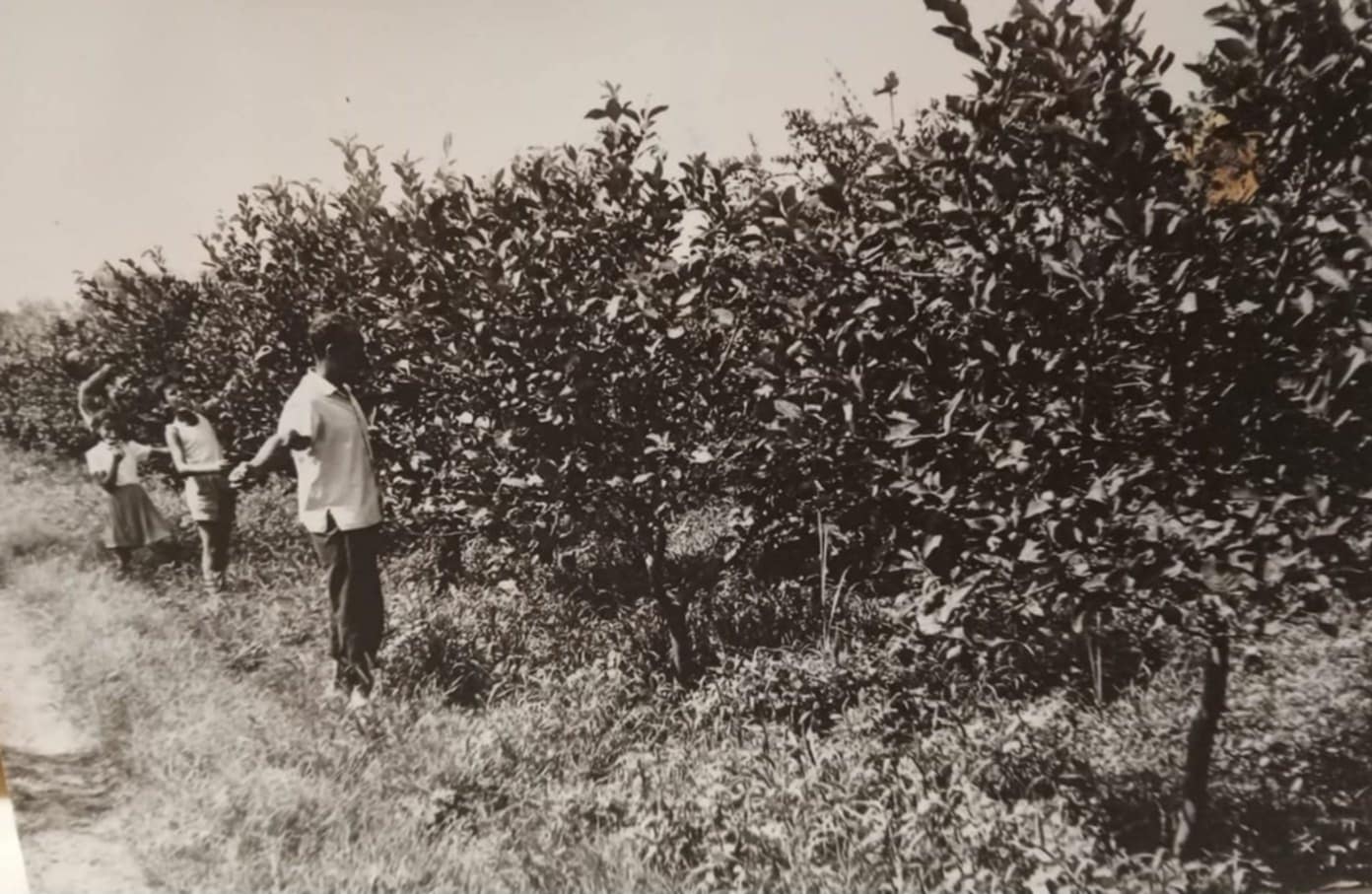
in the lemon garden
Paradise on Earth
Land kissed by the scorching sun
And caressed by the gentle breeze,
In the company of the cicadas,
Their music, a sweet symphony,
The fruit of the soil, a divine goodness.
Mulinazzo was a true Paradise,
Its beauty was mesmerizing:
-The tower, the sea rich of fish,
With emerald and blue crystal water,
The fields full of flowers and lemon clover,
And that pure air, always inebriated
With fragrance of lemon blossoms and jasmine.
At night, the starlit sky
With thousands of twinkling stars
That could be reached with the hands!
Mulinazzo was blessed with God's goodness,
Wherever you walked, could be observed:
-The majestic Carob Trees, centuries old,
Acres of Saracini Olive Trees
Planted there in other eras,
Almond's trees in bloom
That filled nature with beauty,
Lemon orchards, with vibrant green leaves
And stems loaded with beautiful big lemons,
Rows of prickly pears, with fruits of white, yellow, and red color,
And the cane thicket that moved with the wind.
The eyes were filled with wonder and the palate delighted:
White and purple figs,
Their peels torn, dripping with honey,
Grape bundles, sparkling like precious gems,
Hanging down from the vines and pergolas,
Pomegranates, their juicy arils that cheered one's heart,
Peaches and apricots with velvety skin,
Small apples and pears very fragrant.
Mulinazzo was not just land, it was life.
The peasants cared for it with devotion
And admired it with the eyes of a lover.
They worked their lands with lots of sweat
And planted under the sun and frost:
-Tomatoes, cucumbers, zucchini, and eggplants.
The dairy farmers brought the cows to milk*
And made ricotta, vastedda* and cascavaddu* cheese.
The women raised rabbits and chickens
To make eggs, and occasionally, to end up inside a pot.
The fisherman caught the beautiful fish of the sea:
-Whiting, sardines, viola,* and small octopus,
And lived humbly with the low wages earned.
The people were poor, but rich in love,
They all thrived and were content,
Nobody died of hunger, and they lived a long life.
* To milking: daily the cows were brought to a specific dairy farm to be milked.
* Vastedda: soft round cheese.
* Cascavaddu: caciocavallo cheese, a special Sicilian cheese for grating.
* Viola: a small Mediterranean fish with many colors.
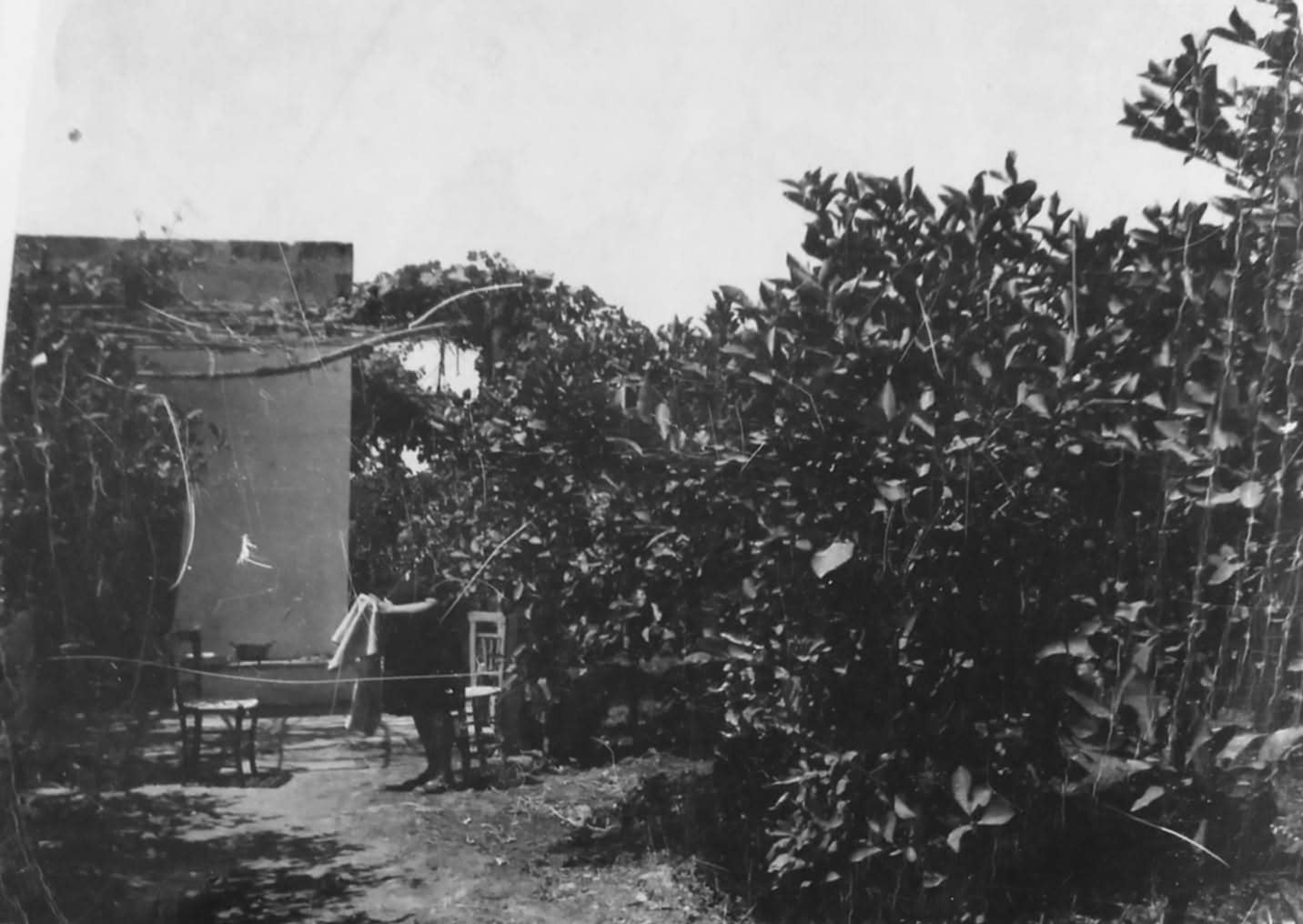
the Manzella family home
The Protest
A voice was heard in town
Of a young man of Cinisi,
Pippinu Mpastatu,
Small in stature,
But with the courageous heart of a lion.
He was warning the people of Cinisi
Of the imminent expropriation,
And incited the town's people
To help the farmers against the villains.
On the established day,
August 11, 1968
There was an air of fervor and courage
In the town of Cinisi,
-it was time to protest.
And like a bridal procession,
Everybody came up from Mulinazzo,
Around one hundred farmers,
Including my family,
And walked on foot to the main street.
Holding the banner high in their hands,
"Potere Contadino,"*
They were followed
By many youths of various political parties:
Pippinu Mpastatu, Totò Matisi,
Who went ahead taking photos,
Francu Maniaci, his brother Romanu,
And a handful of town's people joined in.
Soon they understood the intent
On their arrival at City Hall,
When finding the doors shut.
It was useless to knock, for no one opened,
And with a heart full of rage,
A tough woman,
Mrs. Pippina "a Frisca,"*
Pounded forcefully on the door,
And everybody began to protest.
Loudly resounded the voice
Of Pippinu Mpastatu in the town's square,
Against those who didn't treasure Mulinazzo.
Though the shouting dispersed in the wind,
It didn't penetrate even the massive walls
Built there centuries ago.
The mayor didn't have the courage
To deal with the town's people and pretended not to hear.
The farmers didn't receive any help
And returned home deluded and desperate,
Knowing in their hearts this was a lost cause.
* Potere Contadino: Farmers' Power.
* A Frisca: her nickname.
The Children's Conflict
I was just fifteen years old,
And just like many girls my age,
It was time to fantasize
On being beautiful, attractive,
And one day finding prince charming.
Yet in that tender age,
A heaviness was pressing in my heart,
-The uncertainty of my future.
I only knew the security
Of having a father,
Who was the pillar of the family,
Who worked day and night in his land,
And we all leaned carefree on his shoulders.
With the eyes of a child,
I tried to look at the Mulinazzo situation,
But I was young, still immature.
I desired to be grown up,
Strong, with arms like a giant,
So I could fight
Against those arrogants.
Life had changed overnight,
I had a lump in the throat
And couldn't even cry.
I felt hopeless:
-What will our future hold?
How are we going to live?
And I was on edge with my heart pounding.
Just like me,
Many children of Mulinazzo
Suffered in silence
Of the same uncertainties for the future.
Consequently, among fears and emotional turmoil,
A certain sense of responsibility
Awoke:
-We had to confront reality,
To fight like grown-ups.
Feeling the sense of duty,
We became adults very quickly,
To defend our land,
Like soldiers,
To avoid starving and dying of hunger.
Let us fight, young kids, let us fight!
And do not allow Mulinazzo to be taken,
For shortly,
The ground beneath our feet will be swept away!
Let us stand in the front row defending
And be trampled by the bulldozers!
For the time of having fun is over,
This is the time to fight,
Fight to save Mulinazzo!
The Day that Mulinazzo Cried
(story not appropriate for children)
Even the stones cried that day,
When they came to knock everything down.
They advanced with bulldozers, like traitors,
And without pity, they performed their bravery.
They overturned the entire Mulinazzo,
Destroying the houses still with beds made,
The gebbi,* the barns, the wells with the senia,*
And tearing down the ancient dry-stone walls.
Mr. Peppi "Muccuneddu" lurked
Behind a window for three days,
Holding a loaded rifle, ready to shoot
The first person approaching.
The police discouraged him,
And he was forced to surrender.
The hour arrived for Mulinazzo to cry.
The air itself, that very moment, became still,
To allow the cry of the people in Mulinazzo
To reach the sky.
The earth was upside down.
They did a vengeful massacre,
While the farmers, with loud cries
Fell to the ground on their knees,
Shedding tears without end.
All the people's hard work
Flew to the wind,
To make a landing strip for the airplanes to land.
Even the trees cried that day.
They uprooted all the lemon trees,
The almonds, the figs, the prickly pears,
The black berries, the grape vines,
The quinces, the pomegranates,
The carobs, and the century old olives.
Their roots upturned towards the sky,
And their lives, in no time, were eradicated.
The memory of that day
Playing with the leveled sand,
In that moment surfaced to my mind,
As I stared at Mulinazzo without life,
The earth, reddish in color, flattened,
And all my dreams flew to the wind.
No longer could be seen the paths or country roads,
Where the children used to walk and go to the sea,
And never again to breathe that air of freedom.
Even the animals mourned that day.
The nests of the little birds were destroyed,
And they took away the stables
Of the donkeys and the cows,
And left the chickens without the chicken coop.
There were no more gebbi* for the toads and the frogs,
Not even a twig for the snails,
Or a zagara* blossom for the bumble bees.
The lizards and the terrorized geckos ran away,
While the snakes and the cicigghi* looked for their den.
The dogs barked, as if they knew,
And the cicadas sang their last symphony.
The people of Mulinazzo wept and prayed,
And their wailing reached the sky:
"Where is God when there are such injustices?"
"Why did they forcefully take Mulinazzo?"
"Help us, oh Lord, for on this day we swallow bitter tears,
All our hearts are broken, help us to stand."
"Mulinazzo is finished, we take the grief in our hearts,
They left all of us in hunger and in poverty."
"Let's go now, there is nothing else to do,
Let's go to our town in our prison,
For they left all of us with no bread."
"Goodbye, beloved Mulinazzo,
We lock you deep in our hearts with a key."
"Goodbye, beloved Mulinazzo! Goodbye!"
Who could have imagined that very day,
Lady Violante's property vanished,
And from above, even she wept!
* Gebbia: stone irrigation pool.
* Senia: ancient water wheel used to pull the water out of the well.
* Zagara: lemon blossoms.
* Cicigghiu: gongilos.
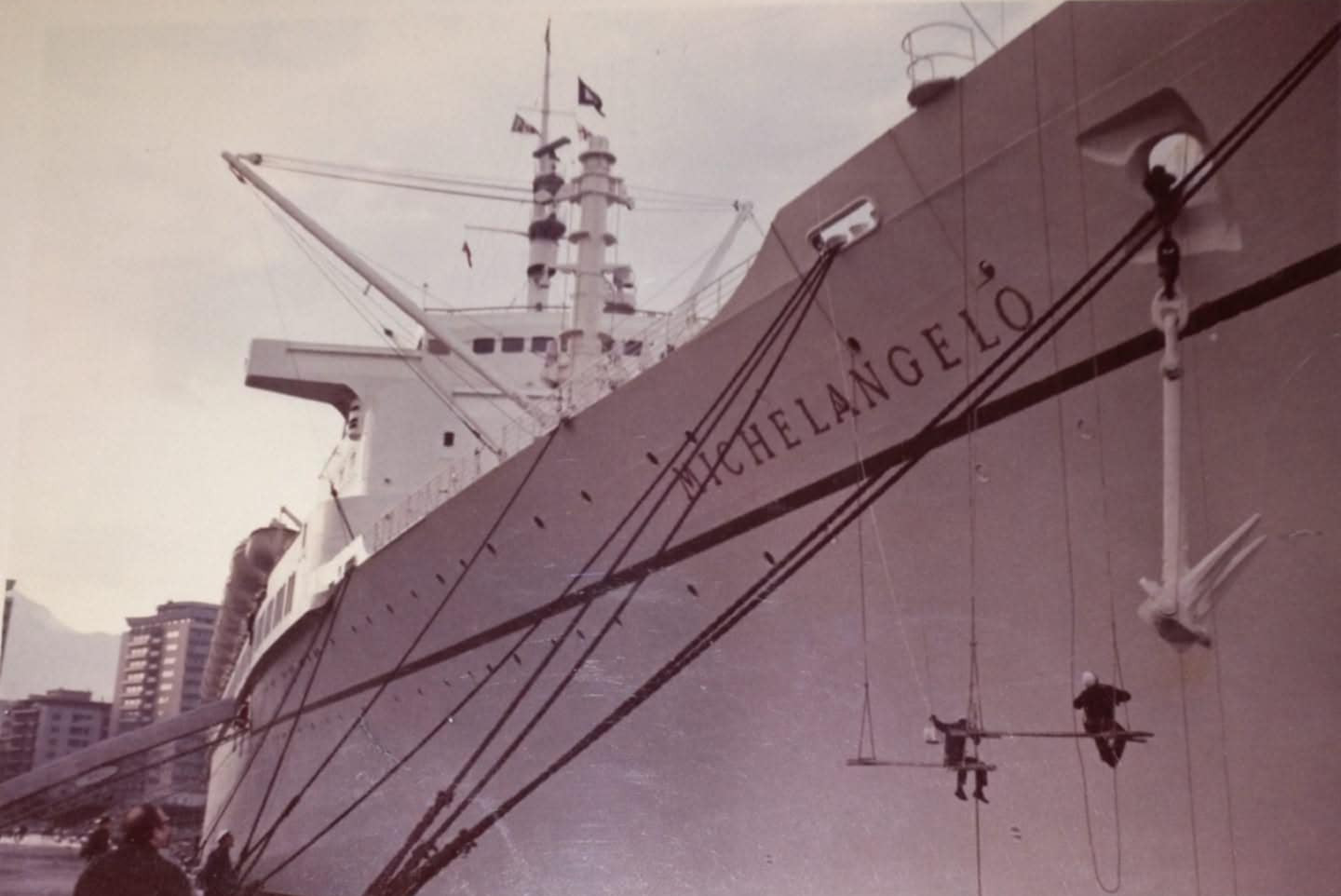
the Michelangelo
Full Eyes and Empty Hands
Torn within and full of sadness,
The families of Mulinazzo went back to town
With tears in their eyes and hearts broken.
Many people out of sorrow got sick,
And others forever lost their peace.
They were left with full eyes and empty hands,
For they took away the small hut they owned.
Many people did not receive any money
For lack of a signed deed,
Since it was common, in those days,
To leave the inheritance by word of mouth,
And the word was considered a contract.
On this occasion, conveniently,
The "Law Usucapiuni"* was not applied,
That gave a person the right to ownership.
Who took the allotted money?
Where did it end up?
Lucky were the ones who got paid,
Compensated with a handful of peanuts
For acres of lemon orchards,
And unlucky were the poor ones,
Who didn't receive a penny
For their uncultivated lands and parcels by the sea.
Their hearts were enraged,
And they expressed their anger with these words:
"Thieves! Who don't have any shame to walk on this earth!"
"Worms to step under the feet!"
"They left the people begging and ruined the whole town."
"They took the land and the sea
And left everybody without their livelihood."
But these words were not enough
To express the rage held within their hearts,
And nothing could console them.
The town of Cinisi paid a high prize
With the loss of Mulinazzo.
It remained trapped, like a prison,
To make room for progress,
With no more land, sea, or future,
While the towns nearby
Developed tourism and thrived.
Many people, advanced in age,
Resigned themselves to staying indoors,
While the younger ones
Found ways to help themselves,
Leaving to other countries
To create their future.
And many families left the town.
And put roots in different nations.
* Law Usucapiuni: the right to ownership for the use of land during a certain length of time.
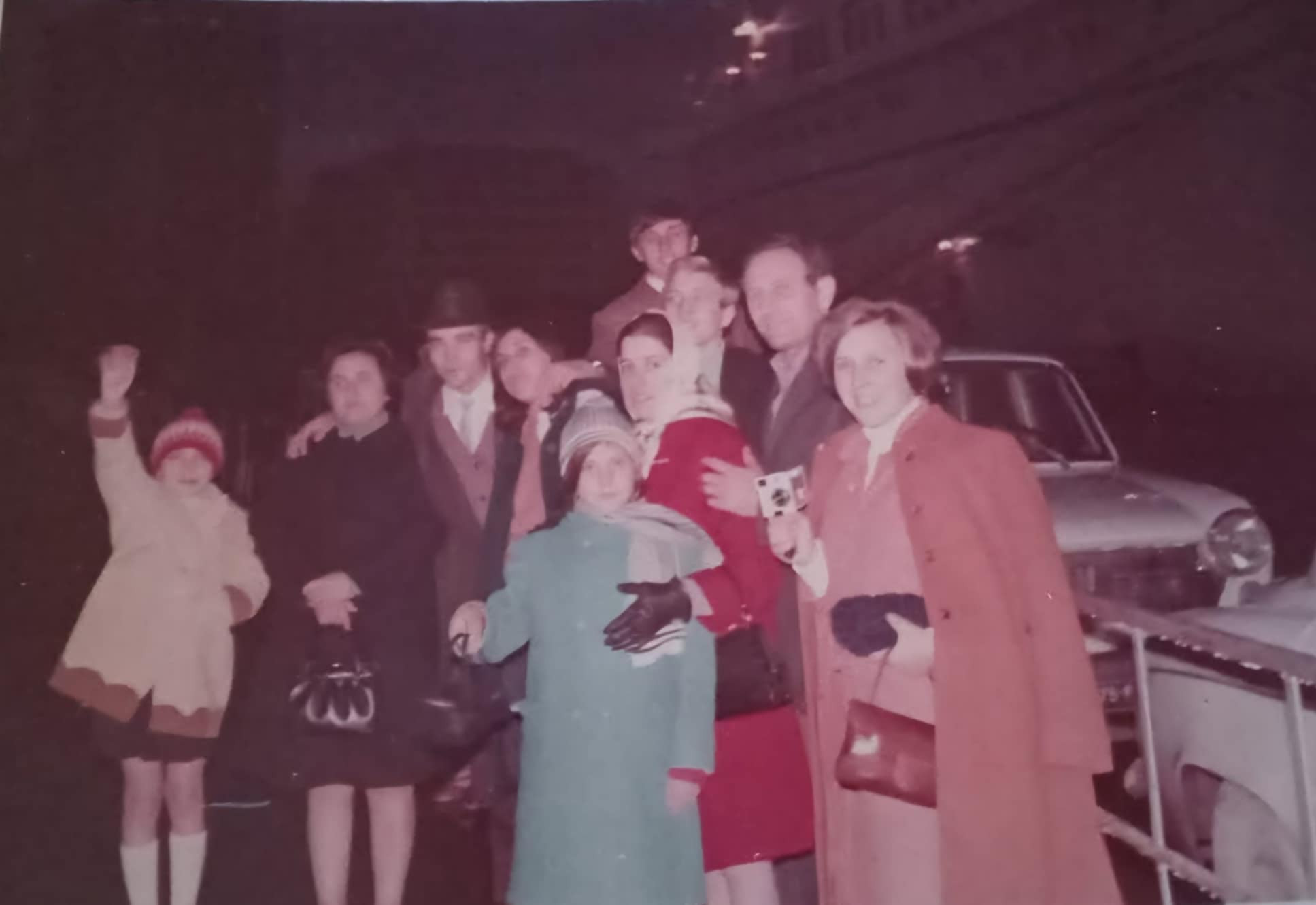
leaving for America
New Land, New Life
Many families, unsure how to live,
Left the native country for good.
They said goodbye to their neighbors and relatives,
And the son gave the last farewell to the elderly:
"Dear Father, dear Mother,
I don't know if we will see each other again."
He departed,
Holding firmly the heartfelt recommendation:
"May God bless you!"
And the tears, like a river, overflowed from his eyes.
With only a jacket
And a cardboard suitcase,
He embarked with his family on a boat.
And like migratory birds,
Many built their nest in foreign lands.
They left for America,
Where everybody said:
"Land rich in work and wealth!"
They crossed the vast ocean,
With mountain high waves,
Before spotting on the horizon
The majestic Statue of Liberty
That gave a warm welcome to the immigrants.
How many hopes were enclosed in their hearts!
But delusions and sacrifices were not lacking
For the new beginning of their lives.
Many, through their creativity and hard work,
Made great this nation,
But in their minds, the desire always remained alive,
The longing for their native land,
To see once more the little town,
Where they left behind their treasured memories,
Remembering with melancholy,
The Mulinazzo so dearly loved.
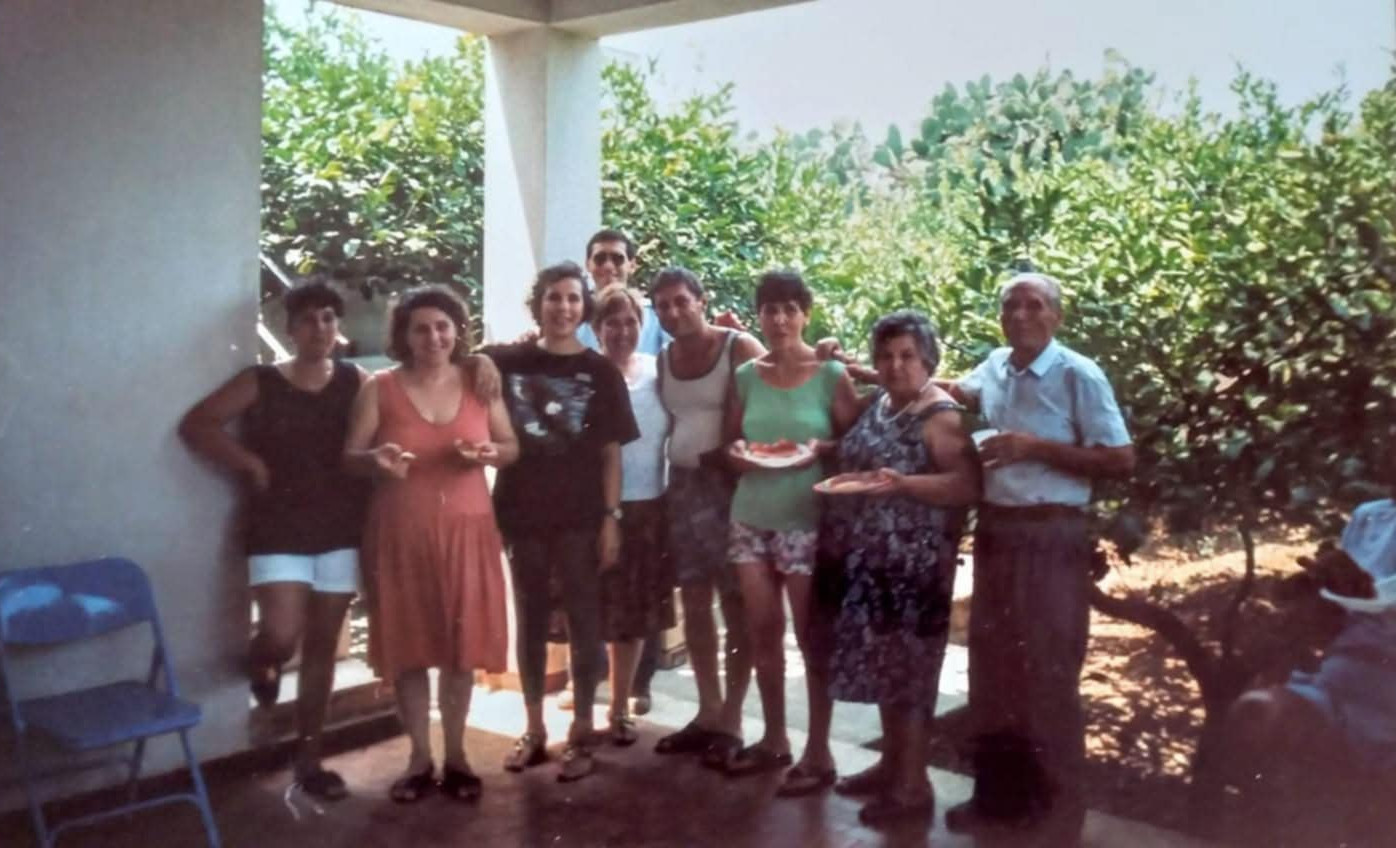
the Manzella family, in the 1980s
The Tower of Mulinazzo
You stood there like a loving mother
That watched over her children,
And the children stared back at their mother.
You stood there like a regal queen,
With a beautiful crown,
And in majesty, governed everybody.
You stood there like a valiant sergeant,
And for many centuries,
Kept guard over the entire town.
Often, all your children
Gathered under your wings,
To enjoy and breathe
The beautiful air of the sea.
How many picnics we enjoyed,
At your feet, by your shade,
With the fresh smell of sea breeze,
Sitting over the cliffs and eating:
-Fried eggplants with slices of bread
And sweet watermelons to cool off the thirst from the scorching sun!
We rejoiced at the richness of the sea:
-Sea urchins, clams, sea anemones,
And excitedly we caught fresh fish:
-Sardines, whiting, viola,* and baby octopus.
Tragically, on the day that was destined,
You could not save us from our enemies
That stole the land of our town,
To make a landing strip covered with tar.
You were the only one left there, mighty and powerful,
On the cliffs, to listen to the whispering of the winds.
You were not demolished, because of your power:
-Ancient structures must not be destroyed!
As for Mulinazzo, it was full of antiquities,
Some in full view, others still hidden,
And to be discovered in the distant future.
They forcefully took it by treason,
Without asking anybody for their consent.
Sadly, on the day Mulinazzo cried,
You couldn't save us from the villains,
Like you did with the sea pirates.
You were left there, alone and abandoned,
With no one to come and comfort you.
Now, we watch you from a distance,
And you, from afar, look at us
And behold all the airplanes,
Flying and landing there.
Now, you weep, weep,
And your tears intermingle with the sea,
Because we left you all alone,
This time and forever,
To the sun and the four winds.
* Viola: a small Mediterranean fish with many colors.
original source
Manzella, Maria Anna (2022). Lu Jornu ca lu Mulinazzu Chiancìu.
This page presents the copyrighted work of Maria Anna Manzella, used with her permission. Reproduction without permission of the author is prohibited.
Copyright © 2022 Maria Anna Manzella


